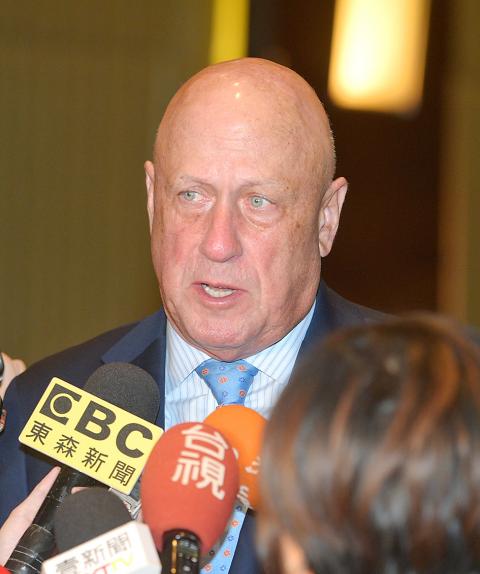Contrary to expectations, the Chinese Communist Party (CCP) is not likely to change its cross-strait policy during its 19th National Congress, which is scheduled to begin on Wednesday, Washington-based Carnegie Endowment for International Peace vice president for studies Douglas Paal said.
Paal, who served as director of the American Institute in Taiwan from 2002 to 2006, yesterday said that he reached the conclusion after speaking with several Chinese officials.
“I have been spending a lot of time trying to talk to people who have Taiwan-related positions in the People’s Republic of China’s official circles. So far they have been more reassuring than frightening in terms of continuity — no big changes,” Paal said on the sidelines of a meeting of Asia-Pacific think-tank leaders in Taipei organized by the Institute for National Policy Research.

Photo: Chang Chia-ming, Taipei Times
However, it remains to be seen whether the officials’ view is in line with that of Chinese President Xi Jinping (習近平), whose mandate is expected to be renewed at the congress in Beijing, he added.
There has been wide speculation regarding how Xi intends to proceed with the Taiwan issue. Some have predicted a hard-line shift, while others have floated the possibility of a military invasion.
In comparison, Paal seemed sanguine about cross-strait development, saying that he hopes Beijing would be willing to work patiently with Taipei and that the Taiwanese government could find a political basis for resuming some of the semi-official connections that were established by the previous Chinese Nationalist Party (KMT) administration.
“But this takes two sides to cooperate and we have to see how [China] develops its leadership and policy during and after the party congress,” he said.
China is overdue in developing better relations with its neighbors, having spent the past 15 years brawling with Japan, Vietnam and most recently India, Paal said.
When asked whether it is feasible for both sides of the Taiwan Strait to engage in friendly interactions and cooperation under the APEC framework, as President Tsai Ing-wen (蔡英文) has suggested, Paal did not give a direct answer.
He instead said he was confident that Xi will “afford respect” to People First Party Chairman James Soong (宋楚瑜), who is set to attend next month’s APEC summit in Da Nang, Vietnam, on Tsai’s behalf.
“It is an opportunity for Taiwan to be represented with all the other nations participating, including [US President] Donald Trump,” he added.
A Taiwanese president has not attended the APEC leadership meeting since the nation became a member of the bloc in 1991 due to obstruction by Beijing.
The highest-level officials to represent the nation’s president at the annual summit were former vice presidents Lien Chan (連戰) and Vincent Siew (蕭萬長) of the KMT.

Taiwanese can file complaints with the Tourism Administration to report travel agencies if their activities caused termination of a person’s citizenship, Mainland Affairs Council Minister Chiu Chui-cheng (邱垂正) said yesterday, after a podcaster highlighted a case in which a person’s citizenship was canceled for receiving a single-use Chinese passport to enter Russia. The council is aware of incidents in which people who signed up through Chinese travel agencies for tours of Russia were told they could obtain Russian visas and fast-track border clearance, Chiu told reporters on the sidelines of an event in Taipei. However, the travel agencies actually applied

Japanese footwear brand Onitsuka Tiger today issued a public apology and said it has suspended an employee amid allegations that the staff member discriminated against a Vietnamese customer at its Taipei 101 store. Posting on the social media platform Threads yesterday, a user said that an employee at the store said that “those shoes are very expensive” when her friend, who is a migrant worker from Vietnam, asked for assistance. The employee then ignored her until she asked again, to which she replied: "We don't have a size 37." The post had amassed nearly 26,000 likes and 916 comments as of this

New measures aimed at making Taiwan more attractive to foreign professionals came into effect this month, the National Development Council said yesterday. Among the changes, international students at Taiwanese universities would be able to work in Taiwan without a work permit in the two years after they graduate, explainer materials provided by the council said. In addition, foreign nationals who graduated from one of the world’s top 200 universities within the past five years can also apply for a two-year open work permit. Previously, those graduates would have needed to apply for a work permit using point-based criteria or have a Taiwanese company

The Shilin District Prosecutors’ Office yesterday indicted two Taiwanese and issued a wanted notice for Pete Liu (劉作虎), founder of Shenzhen-based smartphone manufacturer OnePlus Technology Co (萬普拉斯科技), for allegedly contravening the Act Governing Relations Between the People of the Taiwan Area and the Mainland Area (臺灣地區與大陸地區人民關係條例) by poaching 70 engineers in Taiwan. Liu allegedly traveled to Taiwan at the end of 2014 and met with a Taiwanese man surnamed Lin (林) to discuss establishing a mobile software research and development (R&D) team in Taiwan, prosecutors said. Without approval from the government, Lin, following Liu’s instructions, recruited more than 70 software